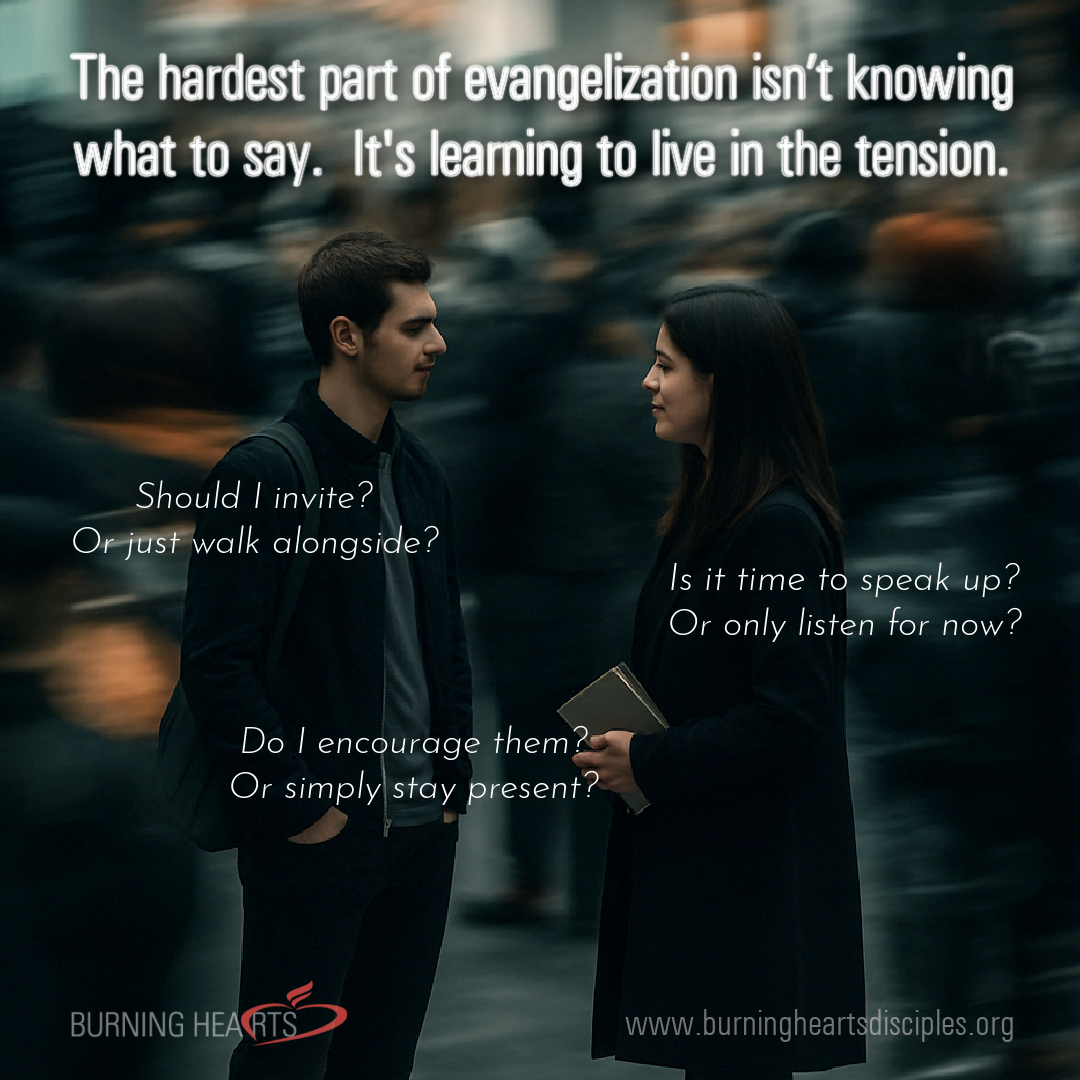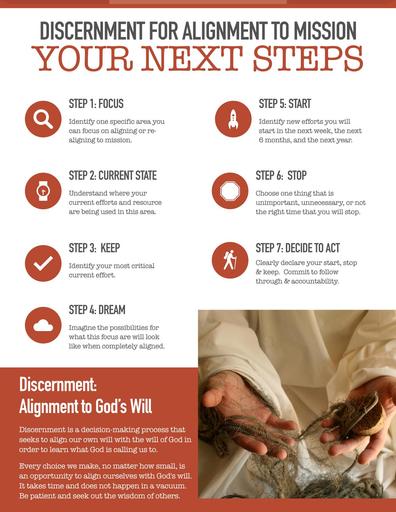Do I speak up now, or just listen? Am I supposed to invite them deeper, or just keep walking alongside for now? Should I encourage them to take a step closer to Jesus, or just let God work quietly in the space between us?
These questions capture the heart of accompaniment-based evangelization. It’s a tension every missionary disciple knows: holding both a pastor’s heart that wants to care tenderly for the person in front of us and a missionary’s urgency that longs to see them take the next step toward Christ.
Holding that tension is not easy. It’s messy. It feels like fumbling in the dark. And yet – it’s exactly where God asks us to live. Both proclamation and patience. Both urgency and gentleness. Both moving and staying.
Why We Resist the Tension
If we’re honest, most of us would rather resolve the tension than live with it.
Some of us lean toward control: we want to push people forward, check the box, “get results.” Others lean toward passivity: we’re so afraid of pushing too hard that we never risk speaking the name of Jesus at all.
Neither extreme reflects authentic accompaniment. Evangelization is relational and Spirit-led. It rarely happens on our timeline, and it almost never follows a straight line.
Our task is not to fix the tension, but to hold it. To pause in the moment and ask: Lord, what are You asking of me right now?
Living Inside the Tension
The hardest part of accompaniment is that you rarely know if you’ve done enough. Did I say too much, not enough, or miss a chance to pray out loud? I still find myself wondering these same things many times. Honestly, I probably get it wrong as often as I get it right.
But God works even through our imperfect words, our small gestures, and our silence.
I often think of Philip and the Ethiopian eunuch in Acts 8. Philip ran up alongside the chariot, asked one question, and then listened. He explained when asked, baptized when prompted, and then stepped aside when the Spirit moved him on. (Acts 8:26-40)
That’s what it means to hold the tension: to run alongside someone for a while – not knowing how long you’ll be there or how far they’ll go – but trusting that God is directing the journey.
An Example: Gifts of Beauty
One way I’ve learned to hold this tension in real life is through the practice of giving small, thoughtful gifts.
When I know I won’t have an ongoing relationship with someone or when I’m not sure what words to say, a gift can be a way to stay present without forcing a next step.
I once gave a friend a small journal with a quote on the cover that she’d mentioned months earlier in passing. She was going through a hard time, and I honestly didn’t know what to say. Later, she told me it felt like God had remembered her through me. I hadn’t preached, shared a verse, or even prayed aloud with her. That tiny gift became the thing that broke through.
I’ve also seen art and music move hearts in ways a book or app can't. Gifts of beauty can speak when words fall short. For example:
- A small print of a sacred image. There's a reason we say that a "picture is worth a thousand words."
- A simple wooden cross or holding stone. Something tactile and comforting can be a physical reminder of your presence – and God's.
- A curated playlist. One evangelizer I met makes Spotify playlists with titles like In the Face of Loss, Hope in the Mess, or Music to Celebrate To, and shares QR codes on cards or via text.
These gifts don’t resolve the tension. They inhabit it. They encourage without forcing. They stay without retreating.
Whatever the gift, pairing it with a handwritten note – sharing why it matters to you or how God spoke to you through that quote, image, or song – makes it personal. And a gentle invitation to reach out if they ever want to talk more can help continue the relational thread, even from afar.
For more concrete inspiration, check out our companion post: 10 Unique Catholic Gift ideas that Evangelize Without Being Cheesy →
Staying With the Tension
Evangelization will always ask us to hold paradox: urgency and patience, proclamation and presence, truth and love.
The question is not How do I eliminate the tension? but Am I willing to live faithfully within it?
The next time you find yourself wondering whether to speak or listen, move or stay – pause. Pray. Discern. And if you feel the Spirit nudging you to offer something, make it a gift of beauty, story, and presence.
To hold the tension is to stay open: to the person in front of me, and to the God who is always already there. It's loving with a pastor’s heart that lingers patiently, while carrying a missionary’s urgency that knows the moment matters. It’s not either/or. It’s the willingness to stand in both, trusting that Christ is already at work.
If you’re looking for more ways to grow in this posture of walking with others, explore our Accompaniment in Action resources. →
Next Steps
- Before your next encounter, pause and pray: Lord, am I called to speak, to move, or to simply stay?
- Trust that God is already at work in the other person’s life. Your role is not to fix the tension, but to hold it with faith, love, and presence.
- Use the Discipleship Check-In to invite the Holy Spirit to help you recognize where someone might be in their journey – and what kind of accompaniment they might need most.


